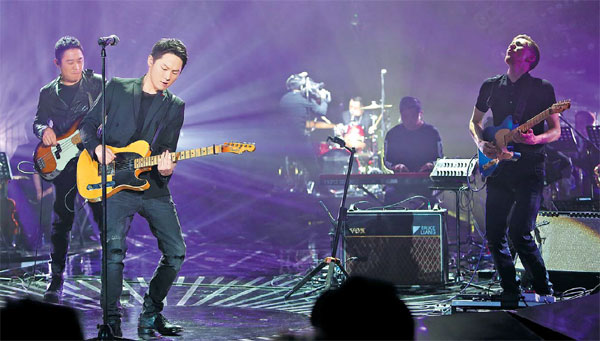TV audiences tune in to singer's talents
After winning top talent show and taking time to explore the US, songwriter is back in the limelight
For young Chinese singer-songwriters, one of the most powerful promotional tools is reality television. And 26-year-old singer-songwriter Liang Bo is one of its success stories.
He won the first season of The Voice of China, a popular reality TV show broadcast on Zhejiang Satellite TV, which premiered in July 2012. Then, he released two albums which featured the young musician's original pop-rock material.
Recently, he returned to the screen by participating in the reality TV show Singer, in which professional singers compete and the audience votes.
|
Liang Bo is known to the public because of the reality show The Voice of China five years ago. He has now returned to the screen, participating in another reality TV show, Singer. Liang has won critical acclaim for his original songwriting and low-profile image. Photos Provided to China Daily |
The other competitors in the show were Hong Kong singer Sandy Lam Yik-lin and Taiwan singer-songwriter Jam Hsiao.
"People got to know me because of the television show five years ago. However, in that show I had to perform other singers' songs," says Liang, who started songwriting in high school.
"With this TV show, Singer, I am allowed to perform my own songs, which is very important to me. I want people to hear my music and I want to tell my stories with music."
One of the songs he performed is Sunset Boulevard, which is on Liang's second album, Mi Cang (2015). Two new songs, Boy and Soul Singer, were premiered on the show.
The three songs were written when Liang spent over a year living in the United States after he won at The Voice of China in 2012.
Just when people expected the young singer-songwriter's career to take off, Liang slowed down. He visited San Francisco and Los Angeles, where he performed on the streets, in bars and met people.
"Nobody knew me, and my English was not very good. But I had great fun there," says Liang.
The song Boy is about a girl he met in San Francisco.
Sunset Boulevard was a place he often visited, especially the instrument shops. He also watched unknown artists perform on the street.
Meanwhile, Liang has dedicated the song Soul Singer to an African-American street singer he met there. "I don't know his name, but I called him 'Chief'," says Liang.
"He took me to dinner and taught me about soul music.
"He didn't sing for money or fame. He sang because he had a passion for music. That's why his music is so touching," says Liang. "I want to be a singer like him.
"I am a person who is not good at handling fame. So, I just do it at my own pace," he adds.
Born in Changchun, Jilin province, in Northeast China, Liang wanted to be a singer-songwriter after getting his first guitar at the age of 12. It was a birthday gift from his mother.
He learned to play it at a local music-training center, where he met professional singer-songwriters.
He recalls that he was so obsessed with the instrument that he drew six lines on his desk in school, resembling guitar strings, and practiced day and night.
At 13 he started writing songs.
Then, in 2009, Liang was admitted into Jilin College of the Arts, majoring in pop music performance.
"I don't have any routine for songwriting. It happens anytime and anywhere, even in the washroom," says Liang.
Thanks to his original songwriting and low-profile image, some critics have compared the young singer-songwriter to established rock musician Dou Wei, who has withdrawn from the limelight and has been focusing on producing instrumental albums.
Speaking about Liang, pop star Na Ying, one of the judges on the reality TV show The Voice of China says: "I can visualize pictures when I listen to him singing. He is calm, which is rare for a man in his 20s."
Surprisingly, Liang cites kung fu legend Bruce Lee as his main musical influence. For Liang, music and Lee's martial arts have a lot in common.
"I watched Lee's movies in middle school and read books about him. He is a philosopher," says Liang. "In a fight, he simply blocks and strikes instinctively without any concern for what is right and wrong. He's also open to various schools of martial arts. It's also true for a singer-songwriter - to be sharp, straightforward and open to various kinds of music."
chennan@chinadaily.com.cn

























